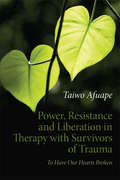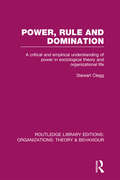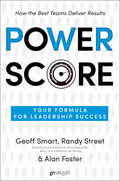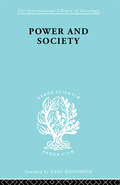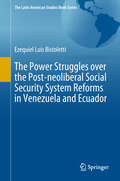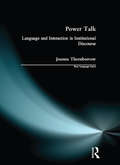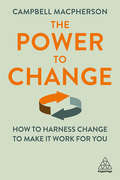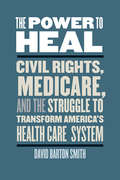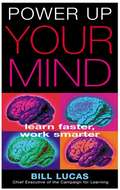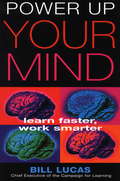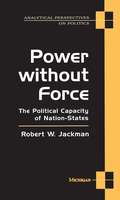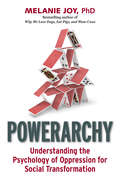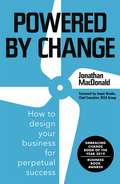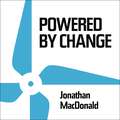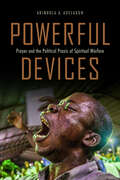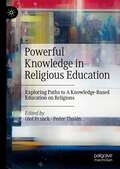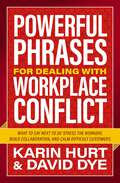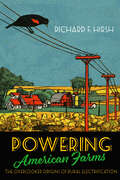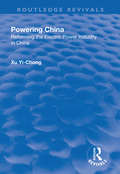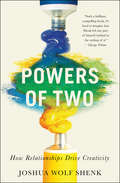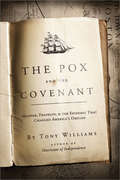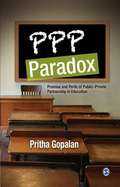- Table View
- List View
Power, Resistance and Liberation in Therapy with Survivors of Trauma: To Have Our Hearts Broken
by Taiwo AfuapeThis book offers reflections on how liberation might be experienced by clients as a result of the therapeutic relationship. It explores how power and resistance might be most effectively and ethically understood and utilised in clinical practice with survivors of trauma. Power, Resistance and Liberation in Therapy with Survivors of Trauma draws together narrative therapy, Coordinated Management of Meaning (CMM) and liberation psychology approaches. It critically reviews each approach and demonstrates what each contributes to the other as well as how to draw them together in a coherent way. The book presents: an original take on CMM through the lenses of power and resistance a new way of thinking about resistance in life and therapy, using the metaphor of creativity numerous case examples to support strong theory-practice links. Through the exploration of power, resistance and liberation in therapy, this book presents innovative ways of conceptualising these issues. As such it will be of interest to anyone in the mental health fields of therapy, counselling, social work or critical psychology, regardless of their preferred model. It will also appeal to those interested in a socio-political contextual analysis of complex human experience.
Power, Rule and Domination: A Critical and Empirical Understanding of Power in Sociological Theory and Organizational Life (Routledge Library Editions: Organizations)
by Stewart CleggThis volume presents a critical analysis of sociological theorizing and power which enables the reader to grasp fully the nature of power, rule and domination in organizational life. By making use of the discussions he recorded at a construction site, the author brings the reader into contact with the everyday social world in which he locates his analysis of power and authority at both a structural and phenomenological level. This analysis is complemented by the author’s review of the literature on ‘theorizing’ by writers such as Wittgenstein, Blum, McHugh, Phillips and Cicourel; his examination of the ‘community power debate’ between authors such as Bachrach and Baratz and Dahl; and a survey of the literature on power in its organizational aspects by Weber, Simmel and the more contemporary work of Hickson.
Power Score
by Randy Street Geoff Smart Alan FosterghSMART, the bestselling team behind Who: The A Method for Hiring, returns with a breakthrough formula for how the best leaders and teams deliver results. "ghSMART is the world's top firm for helping leaders hire talented teams and run them at full power. Nothing is more important."--Marshall Goldsmith, bestselling author of Mojo and What Got You Here Won't Get You There "The most useful book about leadership." That is what we hope you and your team will say after finishing Power Score. Is your team running at full power? Only 10 percent of leaders run their teams at full power. The formula you are about to learn is based on the most extensive research of its kind, spanning more than 15,000 careers with over 9 million data points. The idea has been battle-tested for more than two decades by leaders in every major industry. It works. Successful leadership starts with three key questions: 1. Priorities--Do we have the right priorities? (Only 24 percent of leaders do.) 2. Who--Do we have the right people on the team? (Only 14 percent of leaders do.) 3. Relationships--Do we have the right relationships that deliver results? (Only 47 percent of leaders do.) Learn how to calculate your team's Power Score, and how to improve each of the three key areas of leadership. Learn what to do, and what not do, from compelling statistics and inspiring stories of those leaders who have succeeded and those who have failed. You may be surprised how easy it is to read this little book. And you may be even more surprised by how fast this approach will boost your team's results. When you dial up your team's Power Score, you will make a greater impact as a leader, help your team earn more money for your cause (whatever your cause may be), and enjoy greater career success.Advance praise for Power Score "The power score is the secret sauce that gives the group the information needed to fix problems. The authors provide plenty of guidance presented in an accessible Q&A format."--Success"I wouldn't be surprised if Power Score became the new go-to guide for leadership. Effective teams are key in everything from healthcare to business to government to nonprofits, and this book will help organizations change the conversation about getting results."--Atul Gawande, New York Times bestselling author of Being Mortal and The Checklist Manifesto "Smart, Street, and Foster have turned more than twenty years of research on leadership into a practical, systematic approach for getting results."--Frederick W. Smith, chairman and chief executive officer of FedEx Corporation "My entire team applied the principles of Power Score and has enjoyed explosive growth as a result. Even better, I am having more fun as a leader than ever before."--Jeff Booth, chief executive officer and founder of BuildDirect "The ghSMART team has done it again. With Who, they demystified the process of hiring A Players. Now they have decoded how to become an A+ leader."--Panos Anastassiadis, managing partner of Global CyberFrom the Hardcover edition.
Power Sharing: Language, Rank, Gender and Social Space in Pohnpei, Micronesia
by Elizabeth KeatingLinguistic anthropologist Elizabeth Keating went to the island of Pohnpei, in Micronesia, and studied how people use language and other semiotic codes to reproduce and manipulate status differences.
Power & Society Ils 50: A Framework For Political Inquiry (International Library of Sociology #No. 2)
by Harold D. Lasswell Abraham KaplanFirst published in 1998. Routledge is an imprint of Taylor & Francis, an informa company.
The Power Struggles over the Post-neoliberal Social Security System Reforms in Venezuela and Ecuador (The Latin American Studies Book Series)
by Ezequiel Luis BistolettiThis book carries out a comparative analysis of the power struggles over the post-neoliberal social security reforms in Venezuela and Ecuador. The research breaks down why the social security system reform initiated by Hugo Chávez’ government in Venezuela has come down since its passing in 2002, whereas the social security system reform initiated by Rafael Correa’s government in Ecuador has come along in spite of the obstacles since 2007. All in all, the analysis determined that the struggles over the social security system reforms in both countries remarkably corresponded to each other with regard to their structural conditions, points of contention, and contending actors. In contrast, the analysis established substantial divergences regarding the ways in which the struggles over both reforms came about, due to the divergent development of the struggles for hegemony between government and opposition. These divergences finally brought about the indefinite stagnation of the reform in Venezuela and the advancement of subsequent partial reforms aimed at the universalization of social security in Ecuador.
Power Talk: Language and Interaction in Institutional Discourse (Real Language Series)
by Joanna ThornborrowThe concept of social power, who holds it and how they use it is a widely debated subject particularly in the field of discourse analysis, and the wider arena of sociolinguistics. In her new book,Joanna Thornborrow challenges the received notion that power is necessarily held by some speakers and not by others. Through the detailed analysis of communication and interaction within a range of institutional settings, she examines power as an emerging, negotiated phenomenon between participants with different status and goals. Written in a clear style which combines attention to technical detail with accessibility, Power Talk includes: a comprehensive introduction to the theme of power including the analytic approaches to power in language a wide-ranging discussion of theory and practice and, in-depth contemporary case studies. Power Talk is the first book to focus on the topic of power in situated interaction across a range of contexts. As such, it makes a timely, and important contribution to the debate surrounding social power and language use, and will be of value to both students and researchers alike.
The Power to Change: How to Harness Change to Make it Work for You
by Campbell MacphersonHow we work, the way we live, even how long we live are changing at such a breathtaking pace that only those who can embrace everything that's going on and reinvent themselves will survive and thrive.Yet change - even good change - is tough. Most of us feel utterly powerless when confronted by it, but we're not. Learn to harness challenging situations and see the new opportunities with The Power to Change.The Power to Change does more than simply enable you just to cope with change - it gives you the tools and approaches to embrace and celebrate change. Written by award-winning author, Campbell Macpherson, this book provides a genuinely unique approach to celebrating change that will resonate with readers, no matter what sort of change they have to confront. The Power to Change gives readers the permission to feel emotional and have doubts and fears about change. It provides a range of techniques to put change into perspective, and allows readers to embrace and prosper from the challenges it presents.
The Power to Heal: Civil Rights, Medicare, and the Struggle to Transform America's Health Care System
by David Barton SmithIn less than four months, beginning with a staff of five, an obscure office buried deep within the federal bureaucracy transformed the nation's hospitals from our most racially and economically segregated institutions into our most integrated. These powerful private institutions, which had for a half century selectively served people on the basis of race and wealth, began equally caring for all on the basis of need.The book draws the reader into the struggles of the unsung heroes of the transformation, black medical leaders whose stubborn courage helped shape the larger civil rights movement. They demanded an end to federal subsidization of discrimination in the form of Medicare payments to hospitals that embraced the "separate but equal" creed that shaped American life during the Jim Crow era. Faced with this pressure, the Kennedy and Johnson Administrations tried to play a cautious chess game, but that game led to perhaps the biggest gamble in the history of domestic policy. Leaders secretly recruited volunteer federal employees to serve as inspectors, and an invisible army of hospital workers and civil rights activists to work as agents, making it impossible for hospitals to get Medicare dollars with mere paper compliance. These triumphs did not come without casualties, yet the story offers lessons and hope for realizing this transformational dream.
The Power to Heal: Civil Rights, Medicare, and the Struggle to Transform America's Health Care System
by David Barton SmithIn less than four months, beginning with a staff of five, an obscure office buried deep within the federal bureaucracy transformed the nation's hospitals from our most racially and economically segregated institutions into our most integrated. These powerful private institutions, which had for a half century selectively served people on the basis of race and wealth, began equally caring for all on the basis of need. The book draws the reader into the struggles of the unsung heroes of the transformation, black medical leaders whose stubborn courage helped shape the larger civil rights movement. They demanded an end to federal subsidization of discrimination in the form of Medicare payments to hospitals that embraced the "separate but equal" creed that shaped American life during the Jim Crow era. Faced with this pressure, the Kennedy and Johnson Administrations tried to play a cautious chess game, but that game led to perhaps the biggest gamble in the history of domestic policy. Leaders secretly recruited volunteer federal employees to serve as inspectors, and an invisible army of hospital workers and civil rights activists to work as agents, making it impossible for hospitals to get Medicare dollars with mere paper compliance. These triumphs did not come without casualties, yet the story offers lessons and hope for realizing this transformational dream.This book is the recipient of the Norman L. and Roselea J. Goldberg Prize from Vanderbilt University Press for the best book in the area of medicine.
Power Up Your Mind: Learn Faster, Work Smarter
by Bill LucasBill Lucas, a leading international expert on life-long learning, shows that while we have learned more about how the brain works in the last decade than we have ever known, only a fraction of this is grasped and applied by most people. Power Up Your Mind applies this practical knowledge for the first time and shows you how to learn. Drawing on research from a wide variety of subject areas, from neuroscience to psychology, from motivation theory to accelerated learning, from memory to diet, this book shows how everyone has the capacity to succeed and how most people use only a very small portion of their talents. For learning to be effective, an understanding of how the brain works is essential and unlike most of the recent thinking on the mind, Lucas connects an understanding of the brain with the reality of the workplace and translates what we know about the brain into useful insights for work. Much work-based training is a waste of time and money because the majority of people are neither emotionally ready nor practically inclined to apply their learning to the way they behave. Power Up Your Mind offers a new model of learning-READY, GO, STEADY-which will revolutionize the way you learn and perform.
Power Up Your Mind: Learn Faster, Work Smarter
by Bill LucasBill Lucas, a leading international expert on life-long learning, shows that while we have learned more about how the brain works in the last decade than we have ever known, only a fraction of this is grasped and applied by most people. Power Up Your Mind applies this practical knowledge for the first time and shows you how to learn. Drawing on research from a wide variety of subject areas, from neuroscience to psychology, from motivation theory to accelerated learning, from memory to diet, this book shows how everyone has the capacity to succeed and how most people use only a very small portion of their talents. For learning to be effective, an understanding of how the brain works is essential and unlike most of the recent thinking on the mind, Lucas connects an understanding of the brain with the reality of the workplace and translates what we know about the brain into useful insights for work. Much work-based training is a waste of time and money because the majority of people are neither emotionally ready nor practically inclined to apply their learning to the way they behave. Power Up Your Mind offers a new model of learning-READY, GO, STEADY-which will revolutionize the way you learn and perform.
Power without Force
by Robert W. JackmanExplores the ways states build political capacity; discusses how states learn to resolve conflict politically rather than violently
Powerarchy: Understanding the Psychology of Oppression for Social Transformation
by Melanie JoyHarvard-educated psychologist and bestselling author Melanie Joy exposes the psychology that underlies all forms of oppression and abuse and the belief system that gives rise to this psychology—which she calls powerarchy. Melanie Joy had long been curious as to why people who were opposed to one or more forms of oppression—such as racism, sexism, speciesism, and so forth—often stayed mired in many others. She also wondered why people who were working toward social justice sometimes engaged in interpersonal dynamics that were unjust. Or why people who valued freedom and democracy might nevertheless vote and act against these values. Where was the disconnect?In this thought-provoking analysis, Joy explains how we've all been deeply conditioned by the invisible system of powerarchy to believe in a hierarchy of moral worth—to view some individuals and groups as either more or less worthy of moral consideration—and to treat them accordingly. Powerarchy conditions us to engage in power dynamics that violate integrity and harm dignity, and it creates unjust power imbalances among social groups and between individuals. Joy describes how powerarchies—both social and interpersonal—perpetuate themselves through cognitive distortions, such as denial and justification; narratives that reinforce the belief in a hierarchy of moral worth; and privileges that are granted to some and not others. She also provides tools for transformation. By illuminating powerarchy and the psychology it creates, Joy helps us to work more fully toward transformation for ourselves, others, and our world.
Powered by Change: How to design your business for perpetual success - THE SUNDAY TIMES BUSINESS BESTSELLER
by Jonathan MacDonald**THE SUNDAY TIMES BUSINESS BESTSELLER**Voted the EMBRACING CHANGE BOOK OF THE YEAR at the BUSINESS BOOK AWARDSWhen the winds of change blow, some build a wall and others build a windmillIn a business environment where change is the only constant, the stark reality is that it has never been harder to see what's happening around us, interpret information efficiently or develop successful strategies. This is down to both the increasing speed of change and the prevalent mindset about change, where change is seen as the enemy.Powered by Change presents a radical new methodology for using change as a fuelling mechanism to generate outstanding business success: the Windmill Theory.Power your businessThe Windmill Theory enables leaders and organisations to think and act in a way that capitalises on a constantly changing environment. Constructed of four blades working in perpetual harmony with one another, it creates an empowered business that turns the winds of change into business success.Filled with examples and stories from around the world, from global corporates to start-up ventures, Powered by Change delivers some astonishing insights and clear, actionable steps to achieve the ultimate competitive advantage.Use this book to fuel your business for the future.
Powered by Change: How to design your business for perpetual success - THE SUNDAY TIMES BUSINESS BESTSELLER
by Jonathan MacDonald**THE SUNDAY TIMES BUSINESS BESTSELLER**There's an ancient proverb that states, "When the winds of change are blowing, some build a wall and others build a windmill". In a business environment where change is the only constant, the stark reality is that it has never been harder to see what's happening around us, interpret information efficiently or develop successful strategies. This is down to both the increasing speed of change and the prevalent mindset about change, where change is seen as the enemy. Powered by Change presents a radical new methodology for using change as a fuelling mechanism to generate outstanding business success: the Windmill Theory. Power your businessThe Windmill Theory enables leaders and organisations to think and act in a way that capitalises on a constantly changing environment. Constructed of four blades working in perpetual harmony with one another, it creates an empowered business that turns the winds of change into business success. Filled with examples and stories from around the world, from global corporates to start-up ventures, Powered by Change delivers some astonishing insights and clear, actionable steps to achieve the ultimate competitive advantage.Use this book to fuel your business for the future.(P)2018 Hodder & Stoughton Limited
Powerful Devices: Prayer and the Political Praxis of Spiritual Warfare
by Abimbola Adunni AdelakunPowerful Devices studies spiritual warfare performances as an apparatus for disestablishing structures of power and knowledge, and establishing righteousness in their stead. Drawing on performance studies’ emphasis on radicality and breaking of social norms as devices of social transformation, the book demonstrates how Christian groups with dominant cultural power but who perceive themselves as embattled wield the ideas of performance activism. Combining religious studies with ethnography, Powerful Devices explores Nigerian Pentecostals and US Evangelicals’ praxis of transnational spiritual warfare. By closely studying spiritual warfare prayers as a “device,” Powerful Devices shows how the rituals of prayer enable an apprehension of time, paradigms of self-enhancement, and the subversion of politics and authority. A critical intervention, Powerful Devices explores charismatic Christianity’s relationship to science and secular authority, technology and temporality, neoliberalism, and reactionary ideology.
Powerful Knowledge in Religious Education: Exploring Paths to A Knowledge-Based Education on Religions
by Olof Franck Peder ThalénThis book unites and explores different approaches to understand and develop knowledge-based religious education. While the importance of methodological issues in RE is understood and acknowledged, the editors and contributors interrogate what kind of knowledge should be explored, how this knowledge is defined and what the consequences would be. Subsequently, the book focuses on the concept of powerful knowledge which transcends students' everyday experiences, and how it can be incorporated into the RE curriculum. Drawing together international research from RE teaching and learning, the book explores various paths to integrate a truly knowledge-based religious education. The book will appeal to students and scholars of religious education, sociology of education and the philosophy of religion.
Powerful Phrases for Dealing with Workplace Conflict: What to Say Next to De-stress the Workday, Build Collaboration, and Calm Difficult Customers
by Karin Hurt David DyeAn essential guide to master any workplace conflict with confidence and ease, have less drama, better results, and thrive at work.In many workplaces today, workplace conflict is an escalating issue. The shift to remote work and hybrid teams has left many people longing for deeper human connection. On top of this, add a younger generation clamoring for more feedback and impatient for change, steady advances in technology that can feel threatening to job security, or people reexamining priorities and quietly quitting. Take the increase in anxiety, stress, and depression, mix in the loss of human relationships, and you get less tolerance and understanding leading, ultimately, to more unresolved workplace conflict. Powerful Phrases for Dealing with Workplace Conflict is an essential resource for all employees (and their managers) who are looking for help on how to navigate frequent workplace conflicts, including with their boss and other difficult people, so they can rebuild trust, collaboration, and ultimately enjoy more influence at work. Leadership and workplace culture experts Karin Hurt and David Dye share practical and easy-to-follow tactics such as:Over 300 actual phrases you can use to deescalate common workplace conflict situations, build trust, and make better decisions.Clear examples and explanations of how phrasing will improve interactions.Critical communication tools to ensure workplace issues are addressed before they fester and become more difficult to manage.Findings, real-world cases, and inspiring stories from the World Workplace Conflict and Collaboration Survey of 5000+ people in more than 45 countries conducted by the authors.
Powering American Farms: The Overlooked Origins of Rural Electrification
by Richard F. HirshThe untold story of the power industry's efforts to electrify growing numbers of farms in the years before the creation of Depression-era government programs.Even after decades of retelling, the story of rural electrification in the United States remains dramatic and affecting. As textbooks and popular histories inform us, farmers obtained electric service only because a compassionate federal government established the Tennessee Valley Authority and the Rural Electrification Administration (REA) during the Great Depression of the 1930s. The agencies' success in raising the standard of living for millions of Americans contrasted with the failure of the greedy big-city utility companies, which showed little interest in the apparently unprofitable nonurban market. Traditional accounts often describe the nation's population as split in two, separated by access to a magical form of energy: just past cities' limits, a bleak, preindustrial class of citizens endured, literally in near darkness at night and envious of their urban cousins, who enjoyed electrically operated lights, refrigerators, radios, and labor-saving appliances.In Powering American Farms, Richard F. Hirsh challenges the notion that electric utilities neglected rural customers in the years before government intervention. Drawing on previously unexamined resources, Hirsh demonstrates that power firms quadrupled the number of farms obtaining electricity in the years between 1923 and 1933, for example. Though not all corporate managers thought much of the farm business, a cadre of rural electrification advocates established the knowledge base and social infrastructure upon which New Deal organizations later capitalized. The book also suggests that the conventional storyline of rural electrification remains popular because it contains a colorful hero, President Franklin D. Roosevelt, and villainous utility magnates, such as Samuel Insull, who make for an engaging—but distorted—narrative.Hirsh describes the evolution of power company managers' thinking in the 1920s and early 1930s—from believing that rural electrification made no economic sense to realizing that serving farmers could mitigate industry-wide problems. This transformation occurred as agricultural engineers in land-grant universities, supported by utilities, demonstrated productive electrical technologies that yielded healthy profits to farmers and companies alike. Gaining confidence in the value of rural electrification, private firms strung wires to more farms than did the REA until 1950, a fact conveniently omitted in conventional accounts. Powering American Farms will interest academic and lay readers of New Deal history, the history of technology, and revisionist historiography.
Powering China: Reforming the Electric Power Industry in China (Routledge Revivals)
by Xu Yi-chongThis title was first published in 2002: This study of the Chinese electric power industry examines the ownership and the restructuring of the industry. The reform of the electric power industry is also seen as part of the wider economic development that has been taking place in China, thus providing fresh perspectives on the changes taking place in both the economy and society more generally. Presenting a wealth of extensive research on the subject, the book elucidates the power struggle between political and bureaucratic elite and explains the sensitive and volatile relationship between the central and provincial government against an increasingly complex global background.
Powers of Pilgrimage: Religion in a World of Movement
by Simon ColemanA groundbreaking reframing of religious pilgrimagePious processions. Sites of miraculous healing. Journeys to far-away sacred places. These are what are usually called to mind when we think of religious pilgrimage. Yet while pilgrimage can include journeying to the heart of sacred shrines, it can also occur in apparently mundane places. Indeed, not everyone has the resources or mobility to take part in religiously inspired movement to foreign lands, and some find meaning in religious movement closer to home and outside of officially sanctioned practices. Powers of Pilgrimage argues that we must question the universality of Western assumptions of what religion is and where it should be located, including the notion that “genuine” pilgrimage needs to be associated with discrete, formally recognized forms of religiosity. This necessary volume makes the case for expanding our gaze to reconsider the salience, scope, and scale of contemporary forms of pilgrimage and pilgrimage-related activity. It shows that we need to reflect on how pilgrimage sites, journeys, rituals, stories, and metaphors are entangled with each other and with wider aspects of people’s lives, ranging from an action as trivial as a stroll down the street to the magnitude of forced migration to another country or continent. Offering a new theoretical lexicon and framework for exploring human pilgrimage, Powers of Pilgrimage presents a broad overview of how we can understand pilgrimage activity and proposes that it should be understood not solely as going to, staying at, and leaving a sacred place, but also as occurring in ordinary times, places, and practices.
Powers of Two: How Relationships Drive Creativity
by Joshua Wolf ShenkThe power of collaboration, from Lennon and McCartney to Wozniak and Jobs: &“An inspiring book that also happens to be a great read&” (Daniel H. Pink, author of Drive). Throughout history, partners have buoyed each other to better work—though often one member is little known to the general public. (See Warren Buffett and Charlie Munger, or Vincent and Theo van Gogh.) Powers of Two draws on neuroscience, social psychology, and cultural history to present the social foundations of creativity, with the pair as its primary embodiment. Revealing the six essential stages through which creative intimacy unfolds, this book shows how pairs begin to talk, think, and even look like each other; how the most successful ones thrive on conflict; and why some cease to work together while others carry on. At once intuitive and deeply surprising, Powers of Two will reshape the way you view individuals, relationships, and society itself. &“A rare glimpse into the private realms of duos . . . A natural storyteller.&” —The New York Times &“A book about magic, about the Beatles, about the chemistry between people, about neuroscience, and about the buddy system; it examines love and hate, harmony and dissonance, and everything in between . . . Wise, funny, surprising, and completely engrossing.&” —Susan Orlean &“We sometimes think of creativity as coming from brilliant loners. In fact, it more often happens when bright people pair up and complement each other. Shenk&’s fascinating book shows how to spark the power of this phenomenon.&” —Walter Isaacson &“Surprising, compelling . . . Shenk banishes the idea of solitary genius by demonstrating that our richest art and science come from collaboration: we need one another not only for love, but also for thinking and imagining and growing and being.&” —Andrew Solomon
The Pox and the Covenant
by Tony WilliamsFor one hundred years, God had held to his promise, and the colonists had as well. When the first Puritans sailed into Massachusetts in the seventeenth century, weak from the ocean journey, they formed a covenant with each other and with God to establish a city on a hill-a commitment to live uncorrupted lives together or all suffer divine wrath for their collective sin. But now, a century later, the arrival of one doomed ship would put this covenant to its greatest test. On April 22, 1721, the HMS Seahorse arrived in Boston from the West Indies, carrying goods, cargo, and, unbeknownst to its crew, a deadly virus. Soon, a smallpox epidemic had broken out in Boston, causing hundreds of deaths and panic across the city. The clergy, including the famed Cotton Mather, turned to their standard form of defense against disease: fasting and prayer. But a new theory was also being offered to the public by the scientific world: inoculation. The fierce debate over the right way to combat the tragedy would become a battle between faith and reason, one that would set the city aflame with rage and riot. The Pox and the Covenant is a story of well known figures such as Cotton Mather, James Franklin, and a young Benjamin Franklin struggling to fight for their cause among death and debate-although not always for the side one would expect. In the end, the incredible results of the epidemic and battle would reshape the colonists' view of their destiny, setting for America a new course, a new covenant, and the first drumbeats of revolution.
PPP Paradox
by Pritha GopalanPublic-private partnerships have been in use for a long time, and in many countries, to build roads and bridges, clean rivers, and manage waste. In the last two decades, they have slowly begun to make their presence felt in the field of public education. Several countries, including the United States and India, have recently enacted laws that include partnerships with private entities as a vehicle for education reform. PPP Paradox discusses a swathe of PPPs in education and assesses their approach and contribution to genuine school change. This broad and even-handed survey of a variety of policy positions is followed by specific accounts of reform efforts in two case studies--one from a partnership in middle-school change in curriculum and instruction that took place in the state of Michigan in the United States, and the other from a partnership to bring Montessori education to government-run schools in Chennai, a large Indian city.
